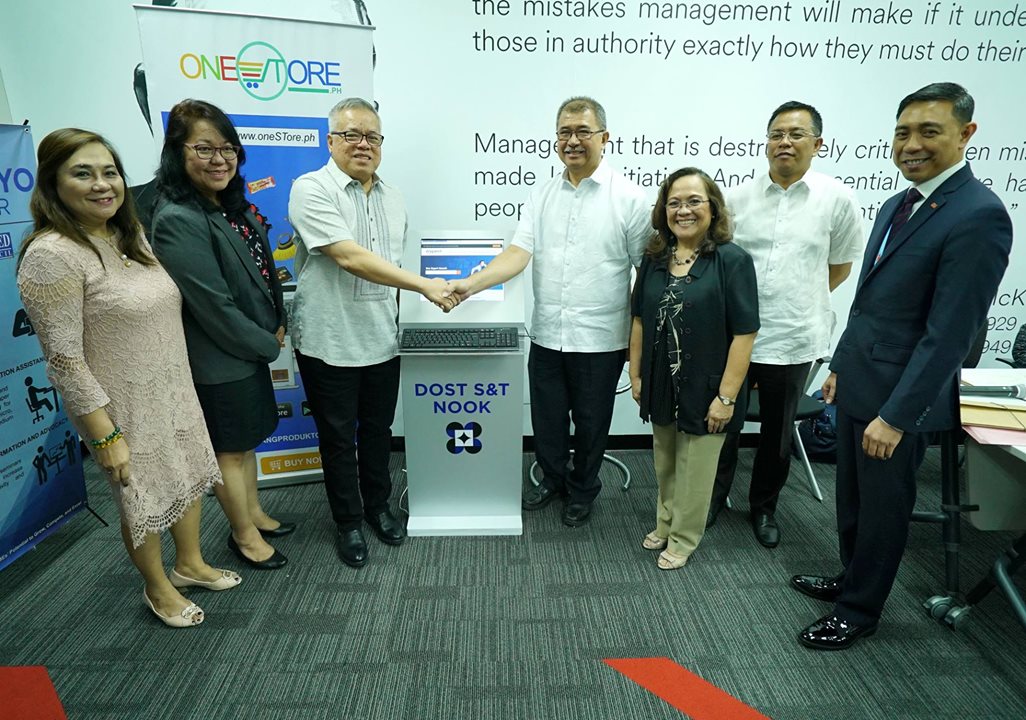DOST scholars run Asean’s first nutrient-testing lab

Science and Technology Secretary Fortunato T. dela Pena (3rd from left) and Undersecretary for Research and Development Dr. Rowena Cristina L. Guevara (5th from right), together with Food and Nutrition Research Institute (FNRI) Director Dr. Mario V. Capanzana (5th from left), with MetaMetrics staff after a recent ocular visit to the first specialty laboratory for nutrient testing in the Asean region.
The Department of Science and Technology (DOST) has shown time and again that investing in programs to develop the country’s human capital will prove beneficial in the long run.
For instance, the decades-old Balik Scientist Program (BSP) and Science and Technology Scholarship Program have put the country in the position of being the Asean hub for nutrient testing by producing the experts that are capable of running such specialty laboratory.
“By institutionalizing programs such as the BSP and the scholarship scheme for poor but deserving students, the DOST is helping secure a future where public and private institutions can rely on a steady pool of highly skilled talent that they can tap even for specialized activities and business ventures,” said DOST Secretary Fortunato T. dela Pena.
One project that directly benefited from DOST’s BSP and scholarship program is the recently launched MetaMetrics, the first specialty laboratory for nutrient testing in the Asean region.
MetaMetrics, strategically located on Shaw Boulevard in Mandaluyong City, is a Department of Health (DOH)-registered specialty clinical laboratory that provides the most comprehensive line of micronutrient and macronutrient testing. The laboratory provides testing for cellular levels of vitamins, minerals, fatty acids and amino acids to determine nutrient deficiency or toxicity.
MetaMetrics is headed by Dr. Charina De Silva, a Balik Scientist awardee in 1998. The MetaMetrics Laboratory Director obtained her doctorate degree in Bioanalytical Chemistry at University of Florida. She was also a graduate of the DOST-funded Philippine Science High School and a recipient of DOST scholarship while obtaining her BS Chemistry degree. She is determined to “give back” and transfer the expertise she mastered from abroad for the development of the country.
MetaMetrics personnel Mary Rose Fariscal and Carl Rogel Inocentes, meanwhile, were recipients of DOST scholarship grants under Republic Act 7687 from 2007 to 2011 and 2008 to 2012, respectively.
“Mary Rose and I were both financially challenged in college, and through DOST scholarship, we were able to complete our Biochemistry/Chemistry degree from the University of the Philippines,” Inocentes shared.
Also, Meryl Christina Reyes and Jan Kathryne Garcia, both MetaMetrics chemists, were able to enhance their skills and research capabilities as Science Research Specialists for DOST’s Philippine Council for Health Research and Development (PCHRD)-funded projects.
“These DOST-funded projects allowed us to acquire technical skills in handling current laboratory instruments, giving us competitive advantage for the nutrient laboratory,” Reyes said.
The Balik Scientist Program was established in 1975 “to encourage highly trained overseas Filipino scientists and technologists, experts and professionals to return to the Philippines and share their expertise for the acceleration of the scientific, agro-industrial and economic development of the country.”
Dr. De Silva added: “The highly technical team of MetaMetrics Laboratory has benefited from the various scholarship and programs of DOST. As the first specialty diagnostics for nutrient and environmental testing in the Asean region, MetaMetrics Laboratory require highly competent personnel to conduct specialized tests. Through DOST programs, the chemists of the laboratory gainedappropriate education, training, technical capability and technology adoption was possible,” Dr. De Silva said.
Other services offered by MetaMetrics include testing for heavy metal toxicity, food and inhalant allergies and food sensitivities.
The laboratory is equipped with the most advanced instruments and cutting-edge technologies on a par with the best in Europe and the US.
“We use validated analytical methods that require intensive sample preparation and meticulous testing methods, all of these performed by highly competent and internationally trained staff. Our tests help clinicians in providing actionable and targeted interventions to optimize health, prevent disease and support medical management of diseases through nutritional intervention, diet modification and reduction of environmental influences,” Dr. De Silva said.





